人教版七年级下册Unit 2 What time do you go to school?Section B 2a-2c课件(共33张PPT)
文档属性
| 名称 | 人教版七年级下册Unit 2 What time do you go to school?Section B 2a-2c课件(共33张PPT) | 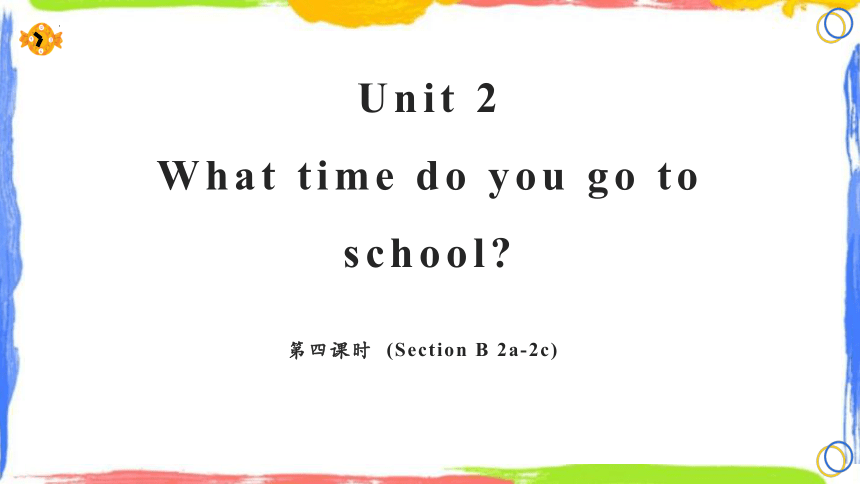 | |
| 格式 | pptx | ||
| 文件大小 | 25.6MB | ||
| 资源类型 | 教案 | ||
| 版本资源 | 人教新目标(Go for it)版 | ||
| 科目 | 英语 | ||
| 更新时间 | 2022-12-13 14:25:54 | ||
图片预览

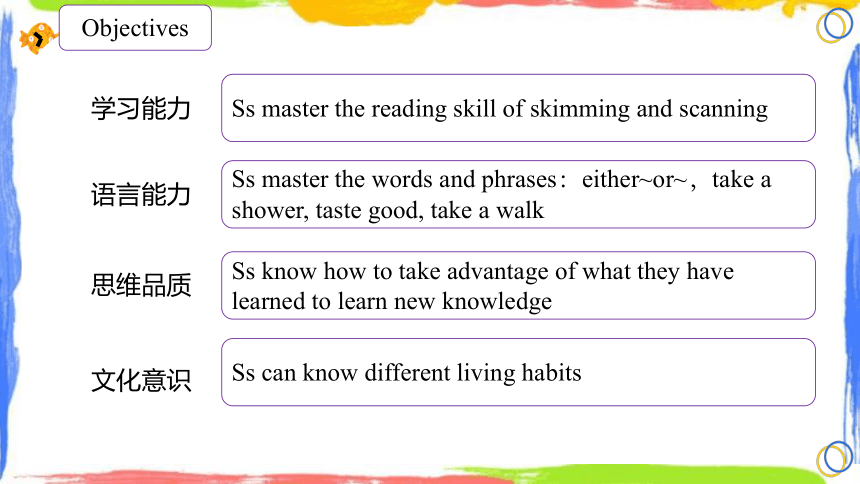
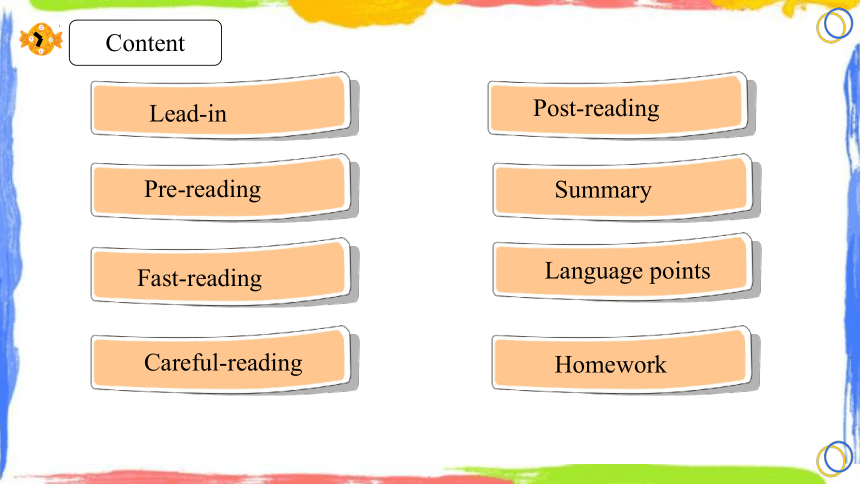
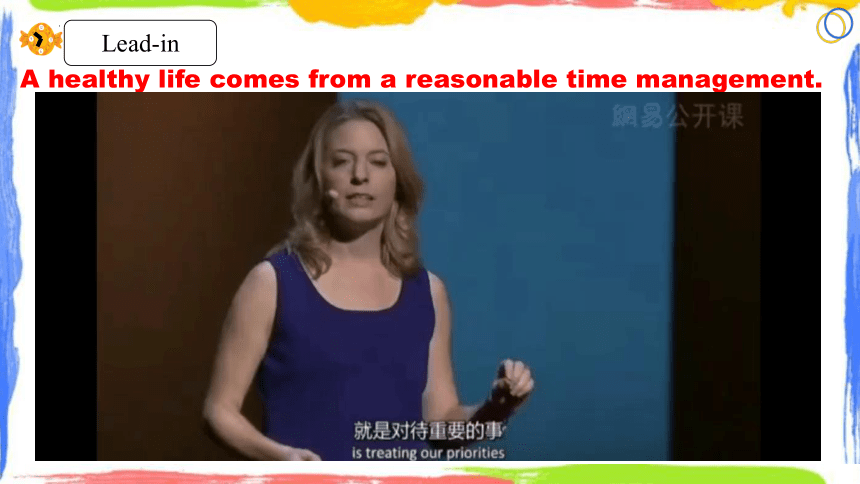
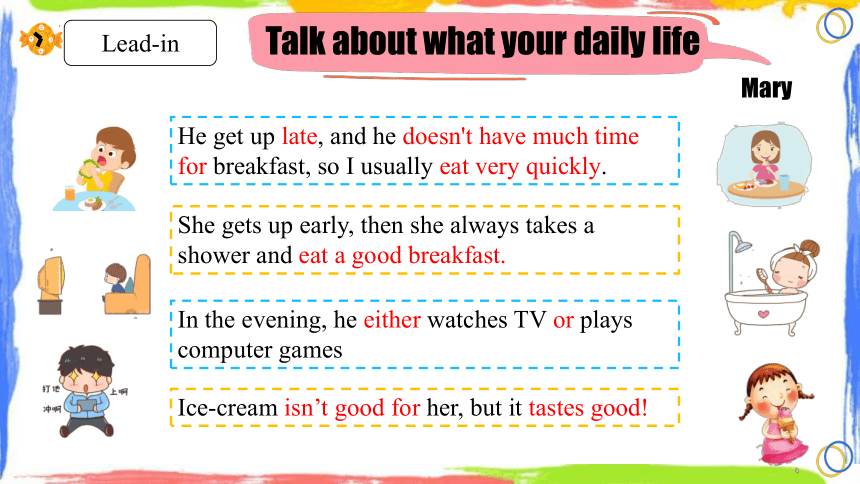
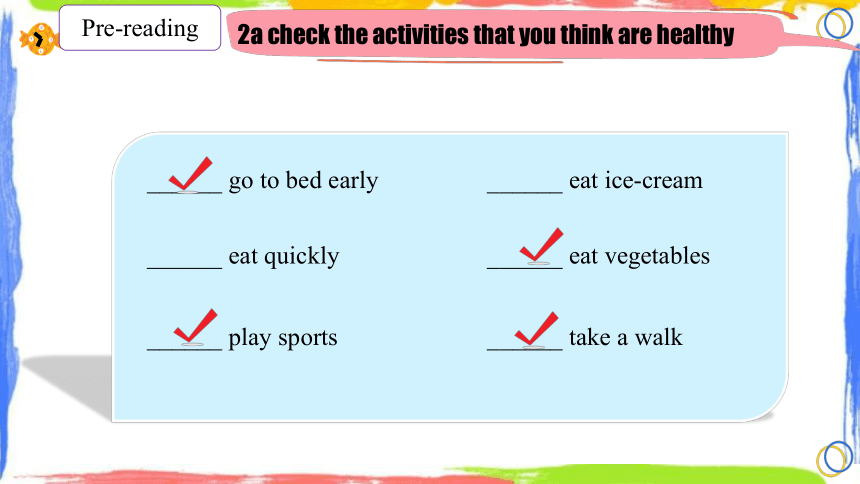
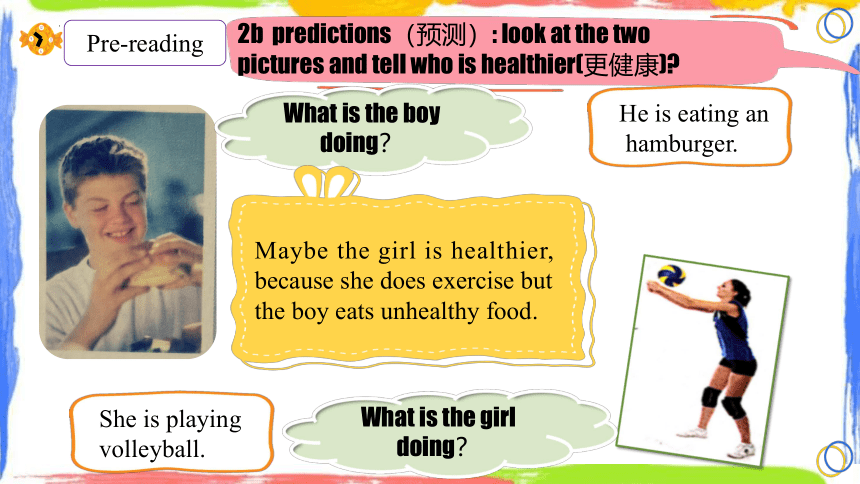
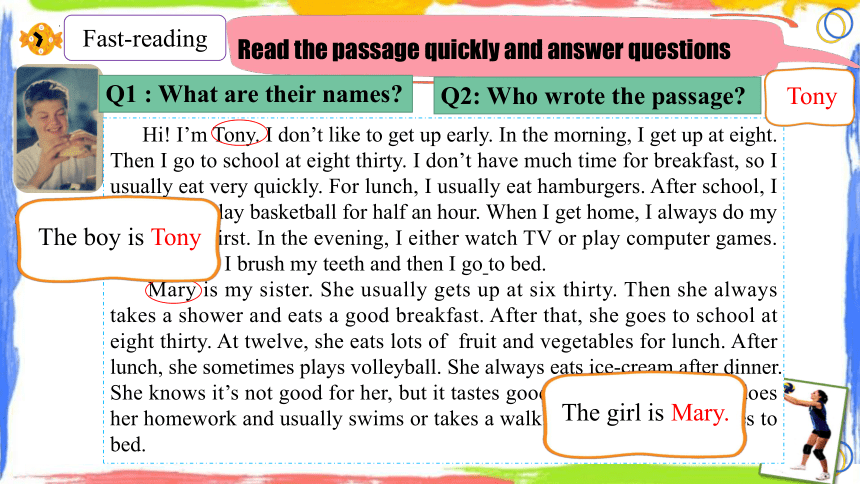
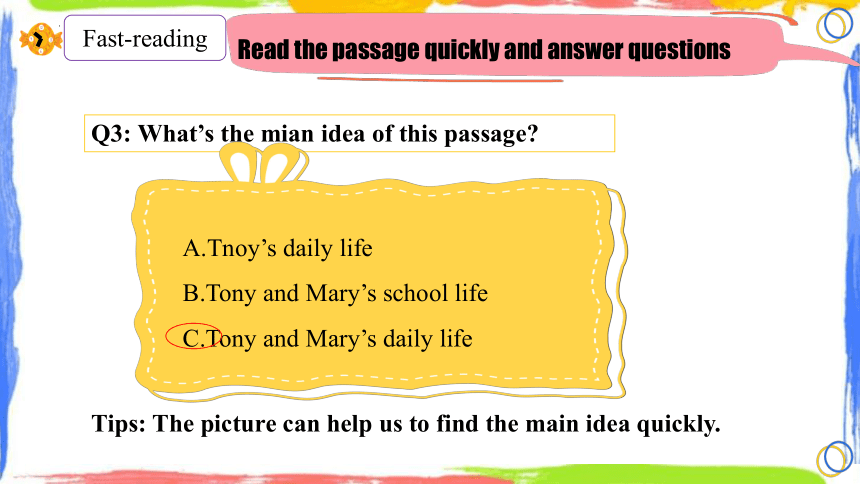
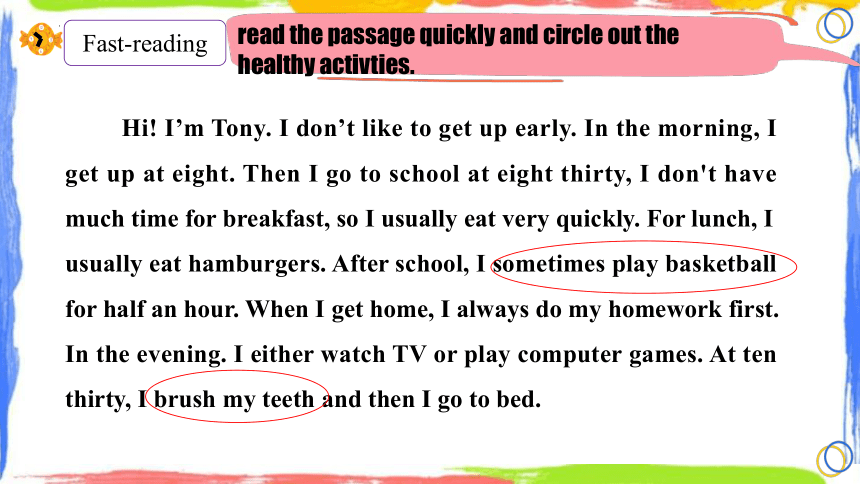
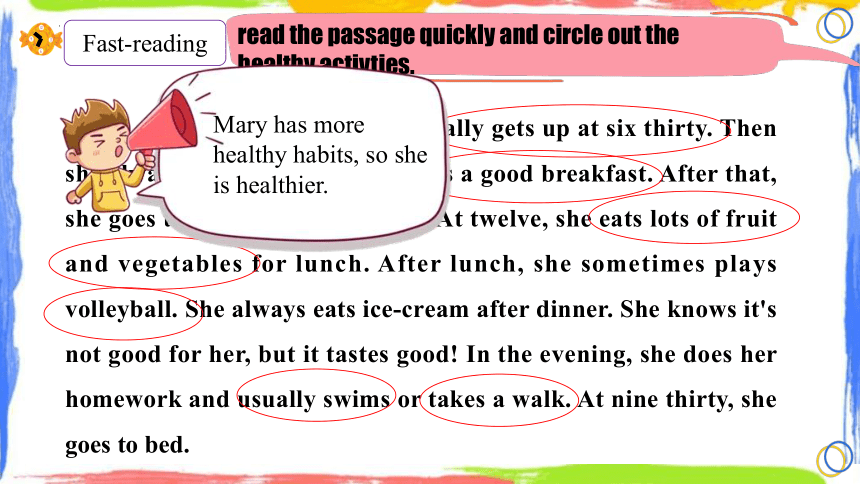
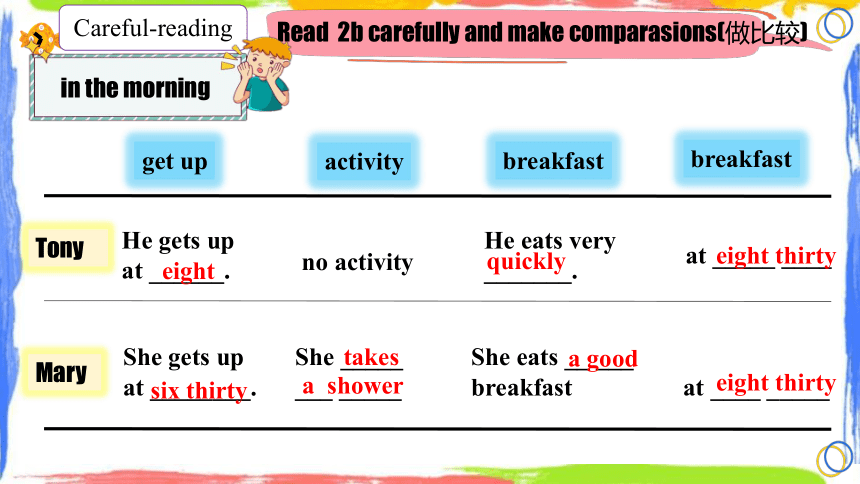
文档简介
(共33张PPT)
Unit 2
What time do you go to school
第四课时 (Section B 2a-2c)
思维品质
语言能力
学习能力
文化意识
Ss master the reading skill of skimming and scanning
Ss master the words and phrases:either~or~,take a shower, taste good, take a walk
Ss know how to take advantage of what they have learned to learn new knowledge
Ss can know different living habits
Objectives
Content
Lead-in
Pre-reading
Fast-reading
Summary
Language points
Homework
Post-reading
Careful-reading
A healthy life comes from a reasonable time management.
Lead-in
v
Lead-in
He get up late, and he doesn't have much time for breakfast, so I usually eat very quickly.
In the evening, he either watches TV or plays computer games
Talk about what your daily life
Mary
She gets up early, then she always takes a shower and eat a good breakfast.
Ice-cream isn’t good for her, but it tastes good!
Pre-reading
2a check the activities that you think are healthy
______ go to bed early
______ eat ice-cream
______ eat quickly
______ eat vegetables
______ play sports
______ take a walk
Pre-reading
2b predictions(预测): look at the two pictures and tell who is healthier(更健康)
What is the boy doing?
What is the girl doing?
He is eating an
hamburger.
She is playing
volleyball.
Maybe the girl is healthier, because she does exercise but the boy eats unhealthy food.
Fast-reading
Read the passage quickly and answer questions
Hi! I’m Tony. I don’t like to get up early. In the morning, I get up at eight. Then I go to school at eight thirty. I don’t have much time for breakfast, so I usually eat very quickly. For lunch, I usually eat hamburgers. After school, I sometimes play basketball for half an hour. When I get home, I always do my homework first. In the evening, I either watch TV or play computer games. At ten thirty, I brush my teeth and then I go to bed.
Mary is my sister. She usually gets up at six thirty. Then she always takes a shower and eats a good breakfast. After that, she goes to school at eight thirty. At twelve, she eats lots of fruit and vegetables for lunch. After lunch, she sometimes plays volleyball. She always eats ice-cream after dinner. She knows it’s not good for her, but it tastes good! In the evening, she does her homework and usually swims or takes a walk. At nine thirty, she goes to bed.
Q1 : What are their names
The boy is Tony
The girl is Mary.
Q2: Who wrote the passage
Tony
Fast-reading
Read the passage quickly and answer questions
Q3: What’s the mian idea of this passage
A.Tnoy’s daily life
B.Tony and Mary’s school life
C.Tony and Mary’s daily life
Tips: The picture can help us to find the main idea quickly.
Fast-reading
read the passage quickly and circle out the healthy activties.
Hi! I’m Tony. I don’t like to get up early. In the morning, I get up at eight. Then I go to school at eight thirty, I don't have much time for breakfast, so I usually eat very quickly. For lunch, I usually eat hamburgers. After school, I sometimes play basketball for half an hour. When I get home, I always do my homework first. In the evening. I either watch TV or play computer games. At ten thirty, I brush my teeth and then I go to bed.
Fast-reading
read the passage quickly and circle out the healthy activties.
Mary is my sister. She usually gets up at six thirty. Then she always takes a shower and eats a good breakfast. After that, she goes to school at eight thirty. At twelve, she eats lots of fruit and vegetables for lunch. After lunch, she sometimes plays volleyball. She always eats ice-cream after dinner. She knows it's not good for her, but it tastes good! In the evening, she does her homework and usually swims or takes a walk. At nine thirty, she goes to bed.
Mary has more healthy habits, so she is healthier.
Careful-reading
Read 2b carefully and make comparasions(做比较)
Tony
Mary
in the morning
get up
He gets up at ______.
She gets up at ________.
activity
no activity
She _____ ___ _____
breakfast
He eats very _______.
She eats __ ___ breakfast
breakfast
at _____ ____
at ____ _____
eight
six thirty
takes
a shower
quickly
a good
eight thirty
eight thirty
Careful-reading
Read 2b carefully and make comparasions(做比较)
in the morning
Think
1. How many hours does Tony have for breakfast
2. If you go to school at 8:30, when will you get up
Less than 30minutes.
Maybe at 7 .
3. What will happen when you get up late
I will be late for school.
Careful-reading
Read 2b carefully and match the pictures with people
Tony
Mary
lunch and after school
Careful-reading
Read 2b carefully and make comparasions(做比较)
lunch and after school
Think
1. How many hours does Tony play basketball
2. Do you think Tony really likes playing basketball
He sometimes play basketball for half an hour.
Maybe not.
3. What do you usually eat for lunch
Lunch is imprtant for us, so we should eat healthy food.
Careful-reading
Read 2b carefully and give (T)or[F]
Tony watches TV and plays computer games in the evening. ( )
Tony goes to bed later than Mary.( )
Mary never eats ice-cream after dinner,because it’s unhealthy.( )
In the evening
either~or~
或者~或者~
F
T
F
Careful-reading
Retell their timelines in a day use “nerve”“usually”“sometimes”
Tony
He ______ gets up early. In the morning, he______ gets up at eight, so he doesn't have much time for breakfast, so he_________eats very quickly. For lunch, he ______ eats hamburgers. After school, he ____________ plays basketball for half an hour. When he gets home, he _______does his homework first. At ten thirty, he _________brushes his teeth and then he goes to bed.
never
usually
usually
usually
sometimes
always
usually
Careful-reading
Retell their timelines in a day use “nerve”“usually”“sometimes”
Mary
She usually gets up at six thirty.
Then she always takes a shower.
After that, she goes to school at eight thirty.
After lunch, she sometimes plays volleyball.
She always eats ice-cream after dinner.
In the evening, she usually swims or takes a walk.
Post-reading
Retell their timelines in a day use “nerve”“usually”“sometimes”
How to tell your day in time order
She usually gets up at six thirty.
Then she always takes a shower.
After that, she goes to school at eight thirty.
After lunch, she sometimes plays volleyball.
She always eats ice-cream after dinner.
In the evening, she usually swims or takes a walk.
at+时间、then、after型、in the morning 等
Post-reading
Group work: Tell your day in your group
get up
eat breakfast
go to school
lunch
after school
dinner
eveing activity
go to bed
group 1,2
group 3,4
group 5,6
Post-reading
Group work: Tell your day in your group
get up
eat breakfast
go to school
For example
S1: I usually get up at six thirty. After that, I have breakfast at 7 o'clock. I have a lot of time to eat brakfast, so I usually eat a healthy breakfast. Then, I go to school at eight thirty.
S2: ……
S3:……
S4(gives a report): S1 usually gets up at……
Post-reading
Group work: Tell your day in your group
Tips:
1. use frequency words: never,often,usually,sometimes...
2. use time words: at+时间,after型,in the morning 等
3. pay attention to the verbs
Habits form character, decided the fate of character.
习惯形成性格,性格决定命运。
Post-reading
In this lesson, we have learned:
1. how to tell healthy habits from unhealthy ones;
2. how to use “either ...or ...”, “be good/bad for” and “taste”;
3. how to change unhealthy habits into healthy ones.
Summary
1. In the evening, I either watch TV or play computer games.
晚上我要么看电视要么玩电脑游戏。
表示“要么…要么…;不是…就是…;或…或…”。
either …or …
这个结构可用来连接两个独立的词、短语、甚至独立的句子。
Language points
eg:
You can come either today or tomorrow.
你可以今天或明天来。
Either you leave now or I’ll call the police!
要么你现在就离开,不然我就打电话报警!
我完成作业后,要么读书,要么运动。
When he has any questions, he either asks his classmates or turns to teachers, and never leaves questions until the next day.
When I finish my homework, I either do some reading or do some sports.
当他有疑问时,他要么问同学,要么问老师,从来不把问题留到第二天。
Language points
表示“对…有益”;
be good for …
表示“对…有害”。
be bad for …
2. She knows it’s not good for her, but it tastes good!
她知道这对她(健康)不利,但它(指冰淇淋)却很好吃。
It’s good for our health to go to bed early and get up early.
eg: 早睡早起对我们的健康有好处。
不要在暗处看书,这对你的眼睛有害。
Don’t read in the dark. It’s bad for your eyes.
(吸烟无益健康。)
1. Smoking ____________ your health.
is bad for
(我们希望你戒烟,这对你的健康有利。)
2. We hope you can give up smoking, which will ____________ your health.
be good for
Language points
2. She knows it’s not good for her, but it tastes good!
她知道这对她(健康)不利,但它(指冰淇淋)却很好吃。
表示“吃上去;品尝”
taste
与
“That sounds fun./It looks nice.”
中的 sound 和 look 用
法属于一类,之后常用形容词。
表示感觉的系动词还有 smell(闻起来)和 feel(摸起来)。
2. She knows it’s not good for her, but it tastes good!
她知道这对她(健康)不利,但它(指冰淇淋)却很好吃。
表示“吃上去;品尝”
taste
与
“That sounds fun./It looks nice.”
中的 sound 和 look 用
法属于一类,之后常用形容词。
表示感觉的系动词还有 smell(闻起来)和 feel(摸起来)。
Language points
2. She knows it’s not good for her, but it tastes good!
她知道这对她(健康)不利,但它(指冰淇淋)却很好吃。
This fish smells bad.
这鱼闻着坏了。
这沙发摸上去舒服、柔软。
eg:
This sofa feels nice and soft.
Language points
Although potato chips taste good, she knows they’re not good for her, and so she seldom eats them.
这种布手感很软。
This flower smells very sweet.
This kind of cloth feels very soft.
这朵花闻起来很香。
尽管炸薯条吃起来好吃,但是她知道它们对身体不好,所以她很少吃。
Language points
Homework
完成reading部分 配套练习
Thanks
Unit 2
What time do you go to school
第四课时 (Section B 2a-2c)
思维品质
语言能力
学习能力
文化意识
Ss master the reading skill of skimming and scanning
Ss master the words and phrases:either~or~,take a shower, taste good, take a walk
Ss know how to take advantage of what they have learned to learn new knowledge
Ss can know different living habits
Objectives
Content
Lead-in
Pre-reading
Fast-reading
Summary
Language points
Homework
Post-reading
Careful-reading
A healthy life comes from a reasonable time management.
Lead-in
v
Lead-in
He get up late, and he doesn't have much time for breakfast, so I usually eat very quickly.
In the evening, he either watches TV or plays computer games
Talk about what your daily life
Mary
She gets up early, then she always takes a shower and eat a good breakfast.
Ice-cream isn’t good for her, but it tastes good!
Pre-reading
2a check the activities that you think are healthy
______ go to bed early
______ eat ice-cream
______ eat quickly
______ eat vegetables
______ play sports
______ take a walk
Pre-reading
2b predictions(预测): look at the two pictures and tell who is healthier(更健康)
What is the boy doing?
What is the girl doing?
He is eating an
hamburger.
She is playing
volleyball.
Maybe the girl is healthier, because she does exercise but the boy eats unhealthy food.
Fast-reading
Read the passage quickly and answer questions
Hi! I’m Tony. I don’t like to get up early. In the morning, I get up at eight. Then I go to school at eight thirty. I don’t have much time for breakfast, so I usually eat very quickly. For lunch, I usually eat hamburgers. After school, I sometimes play basketball for half an hour. When I get home, I always do my homework first. In the evening, I either watch TV or play computer games. At ten thirty, I brush my teeth and then I go to bed.
Mary is my sister. She usually gets up at six thirty. Then she always takes a shower and eats a good breakfast. After that, she goes to school at eight thirty. At twelve, she eats lots of fruit and vegetables for lunch. After lunch, she sometimes plays volleyball. She always eats ice-cream after dinner. She knows it’s not good for her, but it tastes good! In the evening, she does her homework and usually swims or takes a walk. At nine thirty, she goes to bed.
Q1 : What are their names
The boy is Tony
The girl is Mary.
Q2: Who wrote the passage
Tony
Fast-reading
Read the passage quickly and answer questions
Q3: What’s the mian idea of this passage
A.Tnoy’s daily life
B.Tony and Mary’s school life
C.Tony and Mary’s daily life
Tips: The picture can help us to find the main idea quickly.
Fast-reading
read the passage quickly and circle out the healthy activties.
Hi! I’m Tony. I don’t like to get up early. In the morning, I get up at eight. Then I go to school at eight thirty, I don't have much time for breakfast, so I usually eat very quickly. For lunch, I usually eat hamburgers. After school, I sometimes play basketball for half an hour. When I get home, I always do my homework first. In the evening. I either watch TV or play computer games. At ten thirty, I brush my teeth and then I go to bed.
Fast-reading
read the passage quickly and circle out the healthy activties.
Mary is my sister. She usually gets up at six thirty. Then she always takes a shower and eats a good breakfast. After that, she goes to school at eight thirty. At twelve, she eats lots of fruit and vegetables for lunch. After lunch, she sometimes plays volleyball. She always eats ice-cream after dinner. She knows it's not good for her, but it tastes good! In the evening, she does her homework and usually swims or takes a walk. At nine thirty, she goes to bed.
Mary has more healthy habits, so she is healthier.
Careful-reading
Read 2b carefully and make comparasions(做比较)
Tony
Mary
in the morning
get up
He gets up at ______.
She gets up at ________.
activity
no activity
She _____ ___ _____
breakfast
He eats very _______.
She eats __ ___ breakfast
breakfast
at _____ ____
at ____ _____
eight
six thirty
takes
a shower
quickly
a good
eight thirty
eight thirty
Careful-reading
Read 2b carefully and make comparasions(做比较)
in the morning
Think
1. How many hours does Tony have for breakfast
2. If you go to school at 8:30, when will you get up
Less than 30minutes.
Maybe at 7 .
3. What will happen when you get up late
I will be late for school.
Careful-reading
Read 2b carefully and match the pictures with people
Tony
Mary
lunch and after school
Careful-reading
Read 2b carefully and make comparasions(做比较)
lunch and after school
Think
1. How many hours does Tony play basketball
2. Do you think Tony really likes playing basketball
He sometimes play basketball for half an hour.
Maybe not.
3. What do you usually eat for lunch
Lunch is imprtant for us, so we should eat healthy food.
Careful-reading
Read 2b carefully and give (T)or[F]
Tony watches TV and plays computer games in the evening. ( )
Tony goes to bed later than Mary.( )
Mary never eats ice-cream after dinner,because it’s unhealthy.( )
In the evening
either~or~
或者~或者~
F
T
F
Careful-reading
Retell their timelines in a day use “nerve”“usually”“sometimes”
Tony
He ______ gets up early. In the morning, he______ gets up at eight, so he doesn't have much time for breakfast, so he_________eats very quickly. For lunch, he ______ eats hamburgers. After school, he ____________ plays basketball for half an hour. When he gets home, he _______does his homework first. At ten thirty, he _________brushes his teeth and then he goes to bed.
never
usually
usually
usually
sometimes
always
usually
Careful-reading
Retell their timelines in a day use “nerve”“usually”“sometimes”
Mary
She usually gets up at six thirty.
Then she always takes a shower.
After that, she goes to school at eight thirty.
After lunch, she sometimes plays volleyball.
She always eats ice-cream after dinner.
In the evening, she usually swims or takes a walk.
Post-reading
Retell their timelines in a day use “nerve”“usually”“sometimes”
How to tell your day in time order
She usually gets up at six thirty.
Then she always takes a shower.
After that, she goes to school at eight thirty.
After lunch, she sometimes plays volleyball.
She always eats ice-cream after dinner.
In the evening, she usually swims or takes a walk.
at+时间、then、after型、in the morning 等
Post-reading
Group work: Tell your day in your group
get up
eat breakfast
go to school
lunch
after school
dinner
eveing activity
go to bed
group 1,2
group 3,4
group 5,6
Post-reading
Group work: Tell your day in your group
get up
eat breakfast
go to school
For example
S1: I usually get up at six thirty. After that, I have breakfast at 7 o'clock. I have a lot of time to eat brakfast, so I usually eat a healthy breakfast. Then, I go to school at eight thirty.
S2: ……
S3:……
S4(gives a report): S1 usually gets up at……
Post-reading
Group work: Tell your day in your group
Tips:
1. use frequency words: never,often,usually,sometimes...
2. use time words: at+时间,after型,in the morning 等
3. pay attention to the verbs
Habits form character, decided the fate of character.
习惯形成性格,性格决定命运。
Post-reading
In this lesson, we have learned:
1. how to tell healthy habits from unhealthy ones;
2. how to use “either ...or ...”, “be good/bad for” and “taste”;
3. how to change unhealthy habits into healthy ones.
Summary
1. In the evening, I either watch TV or play computer games.
晚上我要么看电视要么玩电脑游戏。
表示“要么…要么…;不是…就是…;或…或…”。
either …or …
这个结构可用来连接两个独立的词、短语、甚至独立的句子。
Language points
eg:
You can come either today or tomorrow.
你可以今天或明天来。
Either you leave now or I’ll call the police!
要么你现在就离开,不然我就打电话报警!
我完成作业后,要么读书,要么运动。
When he has any questions, he either asks his classmates or turns to teachers, and never leaves questions until the next day.
When I finish my homework, I either do some reading or do some sports.
当他有疑问时,他要么问同学,要么问老师,从来不把问题留到第二天。
Language points
表示“对…有益”;
be good for …
表示“对…有害”。
be bad for …
2. She knows it’s not good for her, but it tastes good!
她知道这对她(健康)不利,但它(指冰淇淋)却很好吃。
It’s good for our health to go to bed early and get up early.
eg: 早睡早起对我们的健康有好处。
不要在暗处看书,这对你的眼睛有害。
Don’t read in the dark. It’s bad for your eyes.
(吸烟无益健康。)
1. Smoking ____________ your health.
is bad for
(我们希望你戒烟,这对你的健康有利。)
2. We hope you can give up smoking, which will ____________ your health.
be good for
Language points
2. She knows it’s not good for her, but it tastes good!
她知道这对她(健康)不利,但它(指冰淇淋)却很好吃。
表示“吃上去;品尝”
taste
与
“That sounds fun./It looks nice.”
中的 sound 和 look 用
法属于一类,之后常用形容词。
表示感觉的系动词还有 smell(闻起来)和 feel(摸起来)。
2. She knows it’s not good for her, but it tastes good!
她知道这对她(健康)不利,但它(指冰淇淋)却很好吃。
表示“吃上去;品尝”
taste
与
“That sounds fun./It looks nice.”
中的 sound 和 look 用
法属于一类,之后常用形容词。
表示感觉的系动词还有 smell(闻起来)和 feel(摸起来)。
Language points
2. She knows it’s not good for her, but it tastes good!
她知道这对她(健康)不利,但它(指冰淇淋)却很好吃。
This fish smells bad.
这鱼闻着坏了。
这沙发摸上去舒服、柔软。
eg:
This sofa feels nice and soft.
Language points
Although potato chips taste good, she knows they’re not good for her, and so she seldom eats them.
这种布手感很软。
This flower smells very sweet.
This kind of cloth feels very soft.
这朵花闻起来很香。
尽管炸薯条吃起来好吃,但是她知道它们对身体不好,所以她很少吃。
Language points
Homework
完成reading部分 配套练习
Thanks
同课章节目录
- Unit 1 Can you play the guitar?
- Section A
- Section B
- Unit 2 What time do you go to school?
- Section A
- Section B
- Unit 3 How do you get to school?
- Section A
- Section B
- Unit 4 Don't eat in class.
- Section A
- Section B
- Unit 5 Why do you like pandas?
- Section A
- Section B
- Unit 6 I'm watching TV.
- Section A
- Section B
- Review of Units 1-6
- Unit 7 It's raining!
- Section A
- Section B
- Unit 8 Is there a post office near here?
- Section A
- Section B
- Unit 9 What does he look like?
- Section A
- Section B
- Unit 10 I'd like some noodles.
- Section A
- Section B
- Unit 11 How was your school trip?
- Section A
- Section B
- Unit 12 What did you do last weekend?
- Section A
- Section B
